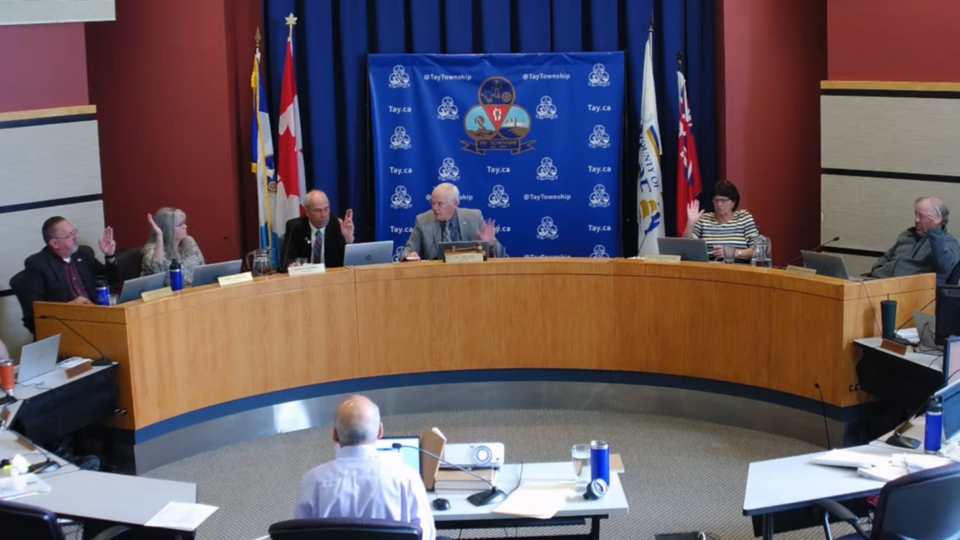The latest round of draft budget talks for Tay Township highlighted a unified council putting resident health at the forefront of tax time, with the intention of letting the taxpayers know of the importance.
Tay council instructed staff during a special meeting to target a four per cent blended tax rate increase for the upcoming 2023 budget, as a response to neighbouring North Simcoe municipalities having approved similar rates for their annual budgets. Previous discussions in February had staff aiming for a three per cent municipal rate, but several council members felt that it was a restrictive goal.
Said Mayor Ted Walker: “When you see what the local municipalities around us are levying, notwithstanding the county levy, I’m not concerned about increasing over that three per cent to maybe four per cent as blended.”
Many on council agreed, including Coun. George LaChapelle who felt three per cent was “too tight”.
“I don’t want to create problems for tomorrow to solve problems today,” said LaChapelle.
Coun. Paul Raymond said that with rising costs of almost everything, it was a municipality’s job to ensure no taxpayer money went to waste.
“If we need four per cent this year to protect and maintain (the future), I would support the four per cent – and I have no problem having a discussion with any resident who thinks we should’ve stayed at three because I’ve seen the bills coming through,” said Raymond along with the nods of his peers.
Although council later sent staff back to revise numbers for the target of four per cent blended for the next meeting in April, there were draft budget approvals within the meeting.
Calculations of a grant from the Ontario Community Infrastructure Fund (OCIF) in years prior had changed for 2023, resulting in a slight decrease of allocation for a total of $961,500 to the township; Tay approved that amount to be used to fund a portion of the Victoria Harbour wastewater treatment plant phase 2 upgrades.
Vacant lots were addressed regarding water and wastewater mains readied to be connected once improvements to those properties are decided upon, as having those mains at the ready requires maintenance. Infrastructure fees for that benefit were recalculated in a 2017 study, and the 2023 budget increased those annual vacant lot fees to $178 for water and $189 for wastewater (from $122 and $132 respectively) as a levy on the final tax bill.
Grant requests from various local organizations were also discussed. Easily, a $136,000 grant for the Severn Sound Environmental Association (SSEA) and $10,000 grant for Culture Alliance in the Heart of Georgian Bay were approved.
Comments of praise went to Georgian Bay General Hospital in their request for $25,000 with an additional ask of $12,500 for physician recruitment.
“I thought it would be important that that cost be shown as a separate line item on our taxes,” said Walker, “because I don’t think most people would be upset with the amount for hospitals. As long as they know what it is – it’s broken out separately, they understand that’s part of our tax bill. But hospitals are something that we all benefit from.”
Regarding Georgian Bay Forever, a $15,000 grant request prompted words of frustration from members of council who felt that the efforts to stop the dangerous invasive phragmites species of plant was limited to municipally-owned properties, as no control efforts were seemingly put in by either private waterfront property owners or the higher levels of government with jurisdiction over Georgian Bay water protection.
Said Deputy Mayor Barry Norris: “I hope through (the SSEA and others) there’ll be mandates back to both the provincial and federal (levels).
“You (the higher governments) better get some kind of funding going here to curtail this, because with the way we’re going, this will overtake every wetland in the area,” Norris said. He added that although municipalities are “the first line of defence”, areas such as Matchedash Bay at Fesserton could be overrun despite being provincial conservation areas.
Discussion around the Economic Development Corporation of North Simcoe (EDCNS) took place, with several members agreeing that a reexamination of the funding formula be applied to Tay on a population-basis rather than an equal amount within the four-partner structure, since Tay as a primarily agricultural region doesn’t host the industrial or commercial aspect which Midland or Penetanguishene does, and would be unlikely to reap the benefits the EDCNS would afford.
“What do we have for businesses in Tay Township? Nobody could tell me,” said LaChapelle, relating how he had spoken to township staff. “There are a lot of home businesses that could be a benefit to EDCNS.
“We don’t have the big strong commercial base like Midland, but we have a lot of private businesses. There could be 150 of them; we don’t have a record of it. Maybe we should because we could reach these people, but we don’t even know what we have in our own municipality,” added LaChapelle.
Funding for EDCNS was approved for the draft budget at $34,000 as a 50 per cent reduction in line with other North Simcoe municipalities.
Staff was directed at the meeting to return with the next draft budget for the April 26 meeting of council.
Further information on the second draft budget can be found within the special council agenda on the Tay Township website.
Tay council meets for regular council meetings every fourth Wednesday of the month. Archives and livestreams of council meetings are available through the Tay Township YouTube channel.
